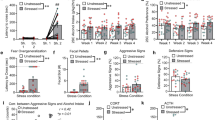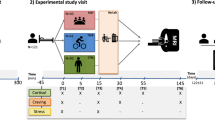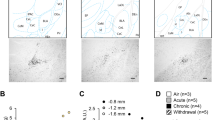Abstract
Corticotropin-releasing hormone (CRH) and its receptor, CRH receptor-1 (CRHR1), have a key role in alcoholism. Especially, post-dependent and stress-induced alcohol intake involve CRH/CRHR1 signaling within extra-hypothalamic structures, but a contribution of the hypothalamic–pituitary–adrenal (HPA) axis activity might be involved as well. Here we examined the role of CRHR1 in various drinking conditions in relation to HPA and extra-HPA sites, and studied relapse-like drinking behavior in the alcohol deprivation model (ADE). To dissect CRH/CRHR1 extra-HPA and HPA signaling on a molecular level, a conditional brain-specific Crhr1-knockout (Crhr1NestinCre) and a global knockout mouse line were studied for basal alcohol drinking, stress-induced alcohol consumption, deprivation-induced intake, and escalated alcohol consumption in the post-dependent state. In a second set of experiments, we tested CRHR1 antagonists in the ADE model. Stress-induced augmentation of alcohol intake was lower in Crhr1NestinCre mice as compared with control animals. Crhr1NestinCre mice were also resistant to escalation of alcohol intake in the post-dependent state. Contrarily, global Crhr1 knockouts showed enhanced stress-induced alcohol consumption and a more pronounced escalation of intake in the post-dependent state than their control littermates. Basal intake and deprivation-induced intake were unaltered in both knockout models when compared with their respective controls. In line with these findings, CRHR1 antagonists did not affect relapse-like drinking after a deprivation period in rats. We conclude that CRH/CRHR1 extra-HPA and HPA signaling may have opposing effects on stress-related alcohol consumption. CRHR1 does not have a role in basal alcohol intake or relapse-like drinking situations with a low stress load.
Similar content being viewed by others
Log in or create a free account to read this content
Gain free access to this article, as well as selected content from this journal and more on nature.com
or
References
Barr CS (2010). Commentary on Nelson et al (2010). Addict Biol 15: 12–14.
Becker HC, Lopez MF (2004). Increased ethanol drinking after repeated chronic ethanol exposure and withdrawal experience in C57BL/6 mice. Alcohol Clin Exp Res 28: 1829–1838.
Blomeyer D, Treutlein J, Esser G, Schmidt MH, Schumann G, Laucht M (2008). Interaction between CRFR1 gene and stressful life events predicts adolescent heavy alcohol use. Biol Psychiatry 63: 146–151.
Chu K, Koob GF, Cole M, Zorrilla EP, Roberts AJ (2007). Dependence-induced increases in ethanol self-administration in mice are blocked by the CRF1 receptor antagonist antalarmin and by CRF1 receptor knockout. Pharmacol Biochem Behav 86: 813–821.
Contet C, Gardon O, Filliol D, Becker JA, Koob GF, Kieffer BL (2011). Identification of genes regulated in the mouse extended amygdala by excessive ethanol drinking associated with dependence. Addict Biol 16: 615–619.
Crusio WE (2004). Flanking gene and genetic background problems in genetically manipulated mice. Biol Psychiatry 56: 381–385.
Crusio WE, Goldowitz D, Holmes A, Wolfer D (2009). Standards for the publication of mouse mutant studies. Genes Brain Behav 8: 1–4.
De Kloet ER (2004). Hormones and the stressed brain. Ann N Y Acad Sci 1018: 1–15.
Fahlke C, Engel JA, Eriksson CJ, Hard E, Soderpalm B (2004). Involvement of corticosterone in the modulation of ethanol consumption in the rat. Alcohol 11: 195–202.
Fahlke C, Eriksson CJ (2000). Effect of adrenalectomy and exposure to corticosterone on alcohol intake in alcohol-preferring and alcohol-avoiding rat lines. Alcohol Alcohol 35: 139–144.
Fahlke C, Hard E, Hansen S (1996). Facilitation of ethanol consumption by intracerebroventricular infusions of corticosterone. Psychopharmacology 127: 133–139.
Finn DA, Snelling C, Fretwell AM, Tanchuck MA, Underwood L, Cole M et al (2007). Increased drinking during withdrawal from intermittent ethanol exposure is blocked by the CRF receptor antagonist D-Phe-CRF(12-41). Alcohol Clin Exp Res 31: 939–949.
Funk CK, O’Dell LE, Crawford EF, Koob GF (2006). Corticotropin-releasing factor within the central nucleus of the amygdala mediates enhanced ethanol self-administration in withdrawn, ethanol-dependent rats. J Neurosci 26: 11324–11332.
Gehlert DR, Cippitelli A, Thorsell A, Lê AD, Hipskind PA, Hamdouchi C et al (2007). 3-(4-Chloro-2-morpholin-4-yl-thiazol-5-yl)-8-(1-ethylpropyl)-2,6-dimethyl-imidazo[1,2-b]pyridazine: a novel brain-penetrant, orally available corticotropin-releasing factor receptor 1 antagonist with efficacy in animal models of alcoholism. J Neurosci 27: 2718–2726.
Gerlai R (1996). Gene-targeting studies of mammalian behavior: is it the mutation or the background genotype? Trends Neurosci 19: 177–181.
Gilpin NW, Richardson HN, Koob GF (2008). Effects of CRF1-receptor and opioid-receptor antagonists on dependence-induced increases in alcohol drinking by alcohol-preferring (P) rats. Alcohol Clin Exp Res 32: 1535–1542.
Hansson AC, Cippitelli A, Sommer WH, Fedeli A, Björk K, Soverchia L et al (2006). Variation at the rat CRFr1 locus and sensitivity to relapse into alcohol seeking induced by environmental stress. Proc Natl Acad Sci USA 103: 15236–15241.
Heilig M, Egli M, Crabbe JC, Becker HC (2010). Acute withdrawal, protracted abstinence and negative affect in alcoholism: are they linked? Addict Biol 15: 169–184.
Heilig M, Koob GF (2007). A key role for corticotropin-releasing factor in alcohol dependence. Trends Neurosci 30: 399–406.
Hölter SM, Engelmann M, Kirschke C, Liebsch G, Landgraf R, Spanagel R (1998). Long-term ethanol self-administration with repeated ethanol deprivation episodes changes ethanol drinking pattern and increases anxiety-related behaviour during ethanol deprivation in rats. Behav Pharmacol 9: 41–48.
Hummel M, Cummons T, Lu P, Mark L, Harrison JE, Kennedy JD et al (2010). Pain is a salient ‘stressor’ that is mediated by corticotropin-releasing factor-1 receptors. Neuropharmacology 59: 160–166.
Koob GF, Le Moal M (2008). Addiction and the brain antireward system. Annu Rev Psychol 59: 29–53.
Lê A, Shaham Y (2002). Neurobiology of relapse to alcohol in rats. Pharmacol Ther 94: 137–156.
Lê AD, Harding S, Juzytsch W, Watchus J, Shalev U, Shaham Y (2000). The role of corticotrophin-releasing factor in stress-induced relapse to alcohol-seeking behavior in rats. Psychopharmacology 150: 317–324.
Liu X, Weiss F (2002). Additive effect of stress and drug cues on reinstatement of ethanol seeking: exacerbation by history of dependence and role of concurrent activation of corticotropin-releasing factor and opioid mechanisms. J Neurosci 22: 7844–7849.
Lu A, Steiner MA, Whittle N, Vogl AM, Walser SM, Ableitner M et al (2008). Conditional mouse mutants highlight mechanisms of corticotropin-releasing hormone effects on stress-coping behavior. Mol Psychiatry 13: 1028–1042.
Marinelli PW, Funk D, Juzytsch W, Harding S, Rice KC, Shaham Y et al (2007). The CRF1 receptor antagonist antalarmin attenuates yohimbine-induced increases in operant alcohol self-administration and reinstatement of alcohol seeking in rats. Psychopharmacology 195: 345–355.
McEwen BS (2007). Physiology and neurobiology of stress and adaptation: central role of the brain. Physiol Rev 87: 873–904.
Müller MB, Preil J, Renner U, Zimmermann S, Kresse AE, Stalla GK et al (2001). Expression of CRHR1 and CRHR2 in mouse pituitary and adrenal gland: implications for HPA system regulation. Endocrinology 142: 4150–4153.
Müller MB, Zimmermann S, Sillaber I, Hagemeyer TP, Deussing JM, Timpl P et al (2003). Limbic corticotropin-releasing hormone receptor 1 mediates anxiety-related behavior and hormonal adaptation to stress. Nat Neurosci 6: 1100–1107.
Nelson EC, Agrawal A, Pergadia ML, Wang JC, Whitfield JB, Saccone FS et al (2010). H2 haplotype at chromosome 17q21.31 protects against childhood sexual abuse-associated risk for alcohol consumption and dependence. Addict Biol 15: 1–11.
Perreau-Lenz S, Zghoul T, de Fonseca FR, Spanagel R, Bilbao A (2009). Circadian regulation of central ethanol sensitivity by the mPer2 gene. Addict Biol 14: 253–259.
Richardson HN, Zhao Y, Fekete EM, Funk CK, Wirsching P, Janda KD et al (2008). MPZP: a novel small molecule corticotropin-releasing factor type 1 receptor (CRF1) antagonist. Pharmacol Biochem Behav 88: 497–510.
Roberto M, Cruz MT, Gilpin NW, Sabino V, Schweitzer P, Bajo M et al (2010). Corticotropin releasing factor-induced amygdala gamma-aminobutyric acid release plays a key role in alcohol dependence. Biol Psychiatry 67: 831–839.
Roberts AJ, Heyser CJ, Cole M, Griffin P, Koob GF (2000). Excessive ethanol drinking following a history of dependence: animal model of allostasis. Neuropsychopharmacology 22: 581–594.
Romanowski CP, Fenzl T, Flachskamm C, Wurst W, Holsboer F, Deussing JM et al (2010). Central deficiency of corticotropin-releasing hormone receptor type 1 (CRH-R1) abolishes effects of CRH on NREM but not on REM sleep in mice. Sleep 33: 427–436.
Sanchis-Segura C, Spanagel R (2006). Behavioural assessment of drug reinforcement and addictive features in rodents: an overview. Addict Biol 11: 2–38.
Schmid B, Blomeyer D, Treutlein J, Zimmermann US, Buchmann AF, Schmidt MH et al (2010). Interacting effects of CRFR1 gene and stressful life events on drinking initiation and progression among 19-year-olds. Int J Neuropsychopharmacol 13: 703–714.
Schmidt MV, Deussing JM, Oitzl MS, Ohl F, Levine S, Wurst W et al (2006). Differential disinhibition of the neonatal hypothalamic–pituitary–adrenal axis in brain-specific CRF receptor 1-knockout mice. Eur J Neurosci 24: 2291–2298.
Silberstein S, Vogl AM, Bonfiglio JJ, Wurst W, Holsboer F, Arzt E et al (2009). Immunology, signal transduction, and behavior in hypothalamic–pituitary–adrenal axis-related genetic mouse models. Ann N Y Acad Sci 1153: 120–130.
Sillaber I, Rammes G, Zimmermann S, Mahal B, Zieglgänsberger W, Wurst W et al (2002). Enhanced and delayed stress-induced alcohol drinking in mice lacking functional CRF1 receptors. Science 296: 931–933.
Sommer WH, Rimondini R, Hansson AC, Hipskind PA, Gehlert DR, Barr CS et al (2008). Upregulation of voluntary alcohol intake, behavioral sensitivity to stress, and amygdala CRFr1 expression following a history of dependence. Biol Psychiatry 63: 139–145.
Spanagel R (2009). Alcoholism—a systems approach from molecular physiology to behavior. Physiol Rev 89: 649–705.
Spanagel R, Bartsch D, Brors B, Dahmen N, Deussing J, Eils R et al (2010). An integrated genome research network for studying the genetics of alcohol addiction. Addict Biol 15: 369–379.
Spanagel R, Hölter SM (1999). Long-term alcohol self-administration with repeated alcohol deprivation phases: an animal model of alcoholism? Alcohol Alcohol 34: 231–243.
Spanagel R, Kiefer F (2008). Drugs for relapse prevention of alcoholism—10 years of progress. Trends Pharmacol Sci 29: 109–115.
Sparta DR, Ferraro 3rd FM, Fee JR, Knapp DJ, Breese GR, Thiele TE (2009). The alcohol deprivation effect in C57BL/6J mice is observed using operant self-administration procedures and is modulated by CRF-1 receptor signaling. Alcohol Clin Exp Res 33: 31–42.
Timpl P, Spanagel R, Sillaber I, Kresse A, Reul JM, Stalla GK et al (1998). Impaired stress response and reduced anxiety in mice lacking a functional corticotropin-releasing hormone receptor 1. Nat Genet 19: 162–166.
Treutlein J, Kissling C, Frank J, Wiemann S, Dong L, Depner M et al (2006). Genetic association of the human corticotropin releasing hormone receptor 1 (CRFR1) with binge drinking and alcohol intake patterns in two independent samples. Mol Psychiatry 11: 594–602.
Tronche F, Kellendonk C, Kretz O, Gass P, Anlag K, Orban PC et al (1999). Disruption of the glucocorticoid receptor gene in the nervous system results in reduced anxiety. Nat Genet 23: 99–103.
Uhart M, Wand GS (2009). Stress, alcohol and drug interaction: an update of human research. Addict Biol 14: 43–64.
Valdez GR, Roberts AJ, Chan K, Davis H, Brennan M, Zorrilla EP et al (2002). Increased ethanol self-administration and anxiety-like behavior during acute ethanol withdrawal and protracted abstinence: regulation by corticotropin-releasing factor. Alcohol Clin Exp Res 26: 1494–1501.
Vengeliene V, Celerier E, Chaskiel L, Penzo F, Spanagel R (2009). Compulsive drug and food taking behaviour in rodents. Addict Biol 14: 384–396.
Vengeliene V, Leonardi-Essmann F, Marston H, Sommer W, Spanagel R (2010). Glycine transporter-1 blockade leads to persistently reduced relapse-like alcohol drinking in rats. Biol Psychiatry 68: 704–711.
Vengeliene V, Siegmund S, Singer MV, Sinclair JD, Li TK, Spanagel R (2003). A comparative study on alcohol-preferring rat lines: effects of deprivation and stress phases on voluntary alcohol intake. Alcohol Clin Exp Res 27: 1048–1054.
Acknowledgements
We thank Sabrina Koch for technical assistance. This work was supported by the Bundesministerium für Bildung und Forschung (NGFN Plus; FKZ: 01GS08152, FKZ: 01GS08155 see under www.ngfn-alkohol.de and Spanagel et al, 2010; FKZ: 01GS08151) and Svenska Sällskapet för Medicinsk Forskning (SSMF).
Author information
Authors and Affiliations
Corresponding author
Ethics declarations
Competing interests
All authors report having no conflict of interest, financial or otherwise. The authors declare that over the past 3 years RS has received compensations for research and consultant contracts from Abbott, GSK, Solvay, and Xenoport.
Additional information
Supplementary Information accompanies the paper on the Neuropsychopharmacology website
Supplementary information
Rights and permissions
About this article
Cite this article
Molander, A., Vengeliene, V., Heilig, M. et al. Brain-Specific Inactivation of the Crhr1 Gene Inhibits Post-Dependent and Stress-Induced Alcohol Intake, but Does Not Affect Relapse-Like Drinking. Neuropsychopharmacol 37, 1047–1056 (2012). https://doi.org/10.1038/npp.2011.297
Received:
Revised:
Accepted:
Published:
Issue date:
DOI: https://doi.org/10.1038/npp.2011.297
Keywords
This article is cited by
-
GPCR and Alcohol-Related Behaviors in Genetically Modified Mice
Neurotherapeutics (2020)
-
Pituitary Adenylate Cyclase-Activating Peptide (PACAP) Signaling and the Dark Side of Addiction
Journal of Molecular Neuroscience (2019)
-
Genetic association of human Corticotropin-Releasing Hormone Receptor 1 (CRHR1) with Internet gaming addiction in Korean male adolescents
BMC Psychiatry (2018)
-
Social rank-associated stress vulnerability predisposes individuals to cocaine attraction
Scientific Reports (2018)
-
Targeted overexpression of CRH receptor subtype 1 in central amygdala neurons: effect on alcohol-seeking behavior
Psychopharmacology (2018)



